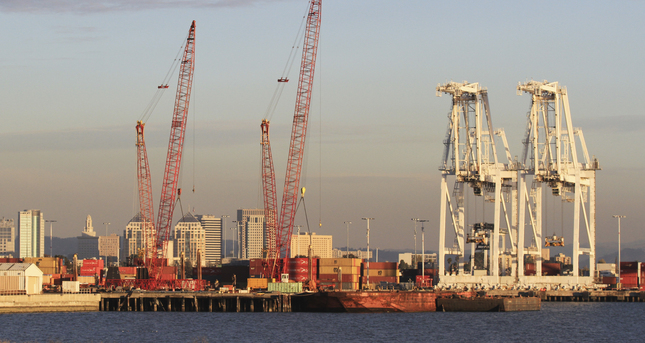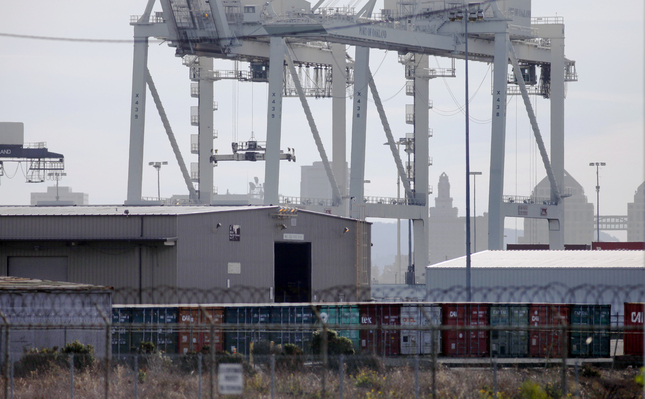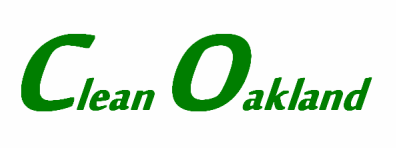 The Oakland skyline is seen behind the area where Terminal Logistics Solutions (TLS), an Oakland-based company, is planning a new terminal for transferring "agriculture and mineral commodities" , most likely where coal will be moved through Oakland, at the port off Burma Road in Oakland, Calif., on Thursday, Nov. 5, 2015. (Laura A. Oda/Bay Area News Group) ( Laura A. Oda ) OAKLAND -- It seems an unlikely match: Oakland -- with its booming new tech economy and position as a leader in fighting climate change -- could become the largest coal exporter on the West Coast. That's the strange possibility facing this East Bay city, which must soon decide its next move. Officials in the past two months have combed over thousands of documents to determine whether they can legally oppose coal shipments from a city-owned bulk commodities terminal being constructed on the old Oakland Army Base. A potential City Council vote could come in December or early next year, but the jury is still out on whether the city has the power to block the plan.Assistant City Administrator Claudia Cappio said the city is hiring consultants to help interpret the mammoth amount of testimony and evidence gathered at a September hearing on coal before making recommendations to the council. "We have to make sure whatever we come up with will stand up, and we need to base it on substantial evidence in the record," she said. The city's answer might just be buried in the agreement developer Phil Tagami signed with the city in 2012. City officials opposing coal believe a short clause in the lengthy contract gives them a legal trump card to reject it -- the right to regulate public health. The city can step in if the development puts "existing or future occupants or users of the project, adjacent neighbors, or any portion thereof, or all of them, in a condition substantially dangerous to their health or safety," according to Section 3.4.2 of the agreement. Activists say the new terminal could draw trainloads of between 5 million and 10 million metric tons of coal from Utah to Oakland, before being loaded onto ships bound for Asia. Complicating any legal questions, however, are the political implications of challenging one of the city's most active, connected players. Tagami, a former port commissioner with deep personal and business ties to Gov. Jerry Brown, won the contract to oversee the city's portion of the Army Base redevelopment to transform about 160 acres adjacent to the Port of Oakland into a $500 million logistics center with new shipping terminals and warehouses. He senses an opportunity as the U.S. coal industry searches for more West Coast export terminals with easy access to countries that rely on fossil fuels for energy. Four Utah counties are prepared to invest $53 million into the new $250 million commodities terminal Tagami is planning with partner Terminal Logistics Solutions. Tagami has claimed that because his contract doesn't expressly prohibit coal, the city has no right to restrict his business. He has said the coal cars would be covered, reducing or eliminating the local threat of airborne pollutants. He could sue if the city interferes. Coal, like all legal commodities shipped by rail, is regulated by the federal government, but Stuart Flashman, a land-use attorney who has worked with opponents of the proposed high-speed rail in California, said that while the courts wouldn't allow Oakland to regulate federal railroads, the city should have the right to choose which commodities it accepts on its own land. It would be different if Tagami were the private owner of a terminal, Flashman said. That's the case in Richmond, where private operators of the Levin-Richmond terminal export under 2 million metric tons of coal shipped from Utah and Colorado every year (Stockton and Long Beach are the two other active coal-shipping terminals in California, with annual exports for each under 2 million tons). The city's first step in its fight against coal was holding a public health hearing in September. Environmentalists, academics and health officials, including Alameda County's public health officer, gave statements about the regional and local health crisis, especially in West Oakland neighborhoods adjacent to the port and freeways, where data show that children are twice as likely to suffer from respiratory illnesses. Cappio said Oakland has a long history of industrial commerce, but the city must analyze how to become more competitive without exposing residents to potential harm. "The port has always been a big part of the Oakland economy," Cappio said. "How do we reduce the historical impacts to communities, particularly in West Oakland?" Activists have already sued Tagami and the city, saying a new environmental review of the bulk terminal project is necessary before the project continues. Mayor Libby Schaaf and several outraged City Council members have spoken out against coal shipments, citing the health threats from coal dust transported locally and global climate change from burning fossil fuels. And some city officials have accused Tagami -- who publicly stated that coal wasn't among the commodities he was planning to export until his plans were exposed in April -- of using bullying tactics and his local connections to endanger a cornerstone economic project for the city. Councilman Dan Kalb, the council member most outspoken against the plan, said Tagami's team, which includes former port executive directors Omar Benjamin and Jerry Bridges, is running a campaign to convince city officials they have no legal standing, an opinion Kalb rejects. "They're trying to scare the council, placate us, to try to make us feel like we have no other options except to go his way," he said. Tagami declined to comment about the project, citing the lawsuit. Public statements and political posturing aside, it remains unclear how hard the council might fight against the hometown developer, whose resume of accomplishments includes the historic Fox Theater and Rotunda building renovations -- back when folks weren't lining up at City Hall to invest in Oakland. "There are some people in the city who feel like Phil should be able to get whatever he wants, and the city should step back and let him do his thing," said one city official with direct knowledge of the issue but who requested anonymity because of the lawsuit. There's a chance that Oakland officials never will have to make a decision. The proposed funding from Utah is reportedly under investigation by that state's attorney general, and Earthjustice's lawsuit against Oakland will move forward regardless how the council votes. Brian Beveridge, a founder of the West Oakland Environmental Indicators Project, thinks the council has enough evidence to uphold its 2014 resolution to oppose crude oil and coal trains. "This doesn't help our community, doesn't help the globe and it's not what the people want," Beveridge said. If 5 million to 10 million tons of coal were shipped through the new terminal, it would mean the equivalent of six to 10 coal trains traveling through Oakland per day, according to Dan Jaffe, a professor of atmospheric and environmental chemistry at the University of Washington who has studied the impacts of coal trains passing through his state to Canada. Studies on the health effects of coal dust from rail transport aren't definitive, Jaffe said, although there has been evidence of coal dust getting into the air and water around terminals and tracks where coal is shipped. Jaffe was unaware of any data on how covered rail cars might prevent coal dust from escaping. He said there are more studies done on exposure to industrial pollutants such as diesel fuel. "It's a question of degrees," he said. "Is any one source going to be absolutely the killer source?" Just how committed Tagami is to coal to make the project pencil out is unknown. But a new environmental review, a lengthy process that could delay completion of the project, is something no one wants. Kalb said he hopes Tagami is looking at other commodities instead of coal. "Every day he doesn't is a wasted day," Kalb said. Activists also aren't sure Tagami would kill a project he spent millions on by anchoring himself to coal, said Jess Dervin-Ackerman, conservation manager at the San Francisco Bay chapter of the Sierra Club, which helped expose the coal plan. "He's developed monumental projects that are significant to the community," she said. "Is coal the last thing he's going to fight for?" Mike Blasky covers Oakland City Hall. Contact him at 510-208-6429. Follow him atTwitter.com/blasky.  The Oakland skyline is seen behind the area where Terminal Logistics Solutions (TLS), an Oakland-based company, is planning a new terminal for transferring "agriculture and mineral commodities" , most likely where coal will be moved through Oakland, at the port off Burma Road in Oakland, Calif., on Thursday, Nov. 5, 2015. (Laura A. Oda/Bay Area News Group) ( Laura A. Oda ) http://www.contracostatimes.com/breaking-news/ci_29092444/oakland-can-it-stop-coal-trains
0 Comments
Leave a Reply. |
Gene HazzardDon't Be Envious of Evil Men Archives
June 2024
Categories
All
|
- Home
- Sanjiv Handa
- Gene's Blog
- Rotunda RFP
- Gene Hazzard -Keeping eyes open
- Chronology of Tagami's scheme of Private-Public Partnership with City Projects
- Another Tagami scheme - Rotunda Building deal
- Oakland Army Base
- Billboards in Oakland
- Port of Oakland
- Oakland Raiders?
-
Who is running Oakland?
- Jerry Brown
- Don Perata
- Judge Robert B. Freedman
- Jacques Barzaghi
- Gawfco Enterprises
- Deception
- Doug Bloch
-
Phil Tagami
>
- SF Business Times November 20, 2005
- Rotunda wrestling
- A conversation with Oakland developer Phil Tagami
- Audit of $91 million Fox Theater project
- Tagami Conflict
- CCIG Response to Oakland Works
- Oakland developer Phil Tagami named to state medical board
- ‘Shotgun Phil’ hits another bullseye — with governor’s help
- CleanOakland Store
- CenterPoint Properties

 RSS Feed
RSS Feed
